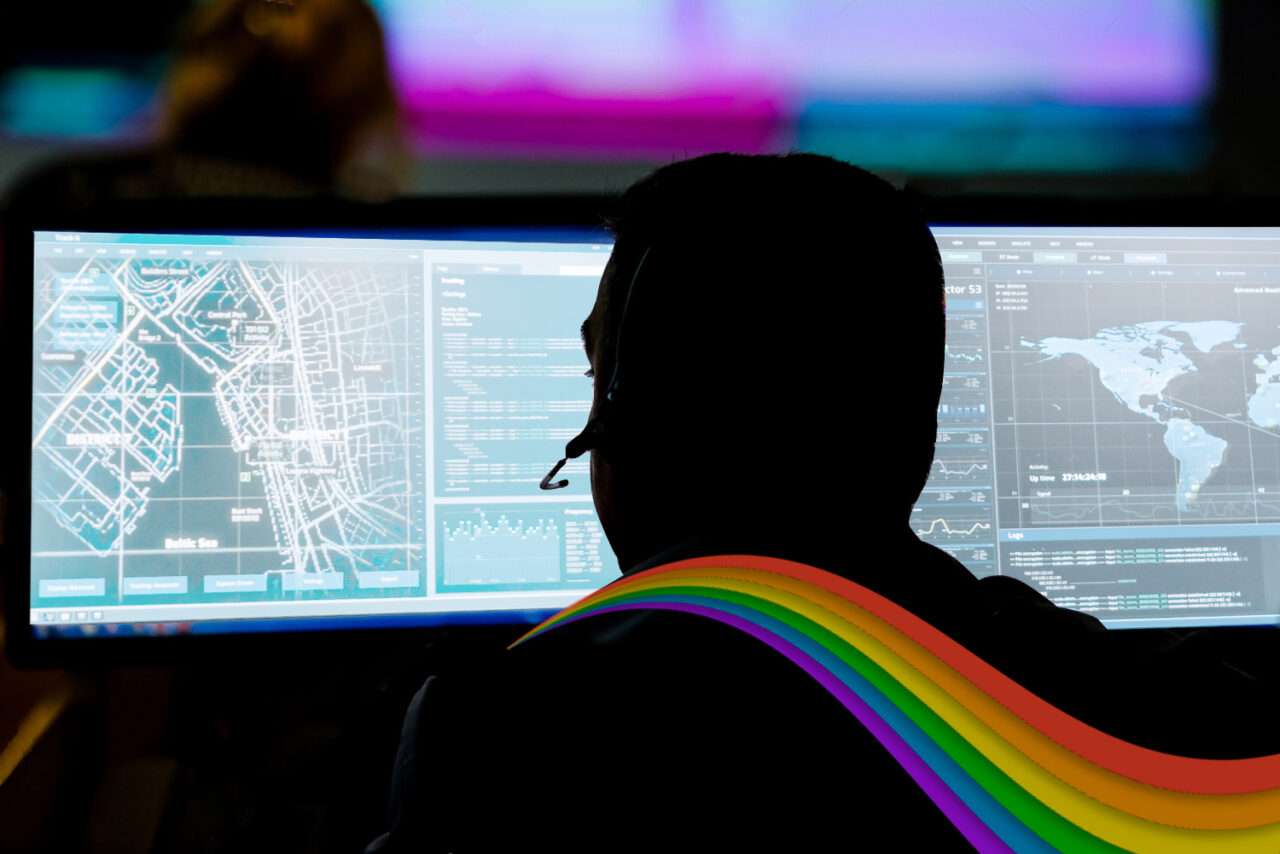
Without a doubt, one of my favorite Disney movies of late has been Encanto. The richness of culture, the importance of family, the magic of authenticity and community shines through at every twist and turn, but there were a few things in the movie that gave me internal pause. Unlike most traditional Disney movies, the villain was not a witch, a sea monster, or a shadow man, it was the internal Madrigal family. The protagonist and the antagonist were one in the same, and while the billboard chart topping hit “We Don’t Talk About Bruno” quickly became a favorite, it hit a little close to home for me.
As a black agender queer person in public safety, that song was the reality for most of my life and career. We don’t talk about race, and we certainly don’t talk about gender identity (who you are) and sexuality (who you love). For years, my identity felt like something I had to tuck away, sweep under the rug, and bag check because it’s too heavy to onboard. The fear and gay panic ensuing when a coworker wants to follow you on social media, or when your supervisor asks you “so what’d you do this weekend?” The simple things that heteronormative people get to share in the workplace became landmines for me, and I found myself constantly playing minesweeper with my identity. We charge people to show up authentically, but when they do, we silence their diversity. We tell them they’re too loud, too young, too different. We make their non-traditional pronouns a burden, we stigmatize their love, we silence their service when they cannot serve with pride. And if the workplace culture doesn’t eat us alive, the citizens have no issue throwing snarls at us. The first time I was called a pejorative (bundle of sticks) by a caller, it hurt so deeply. It showed me there was no safety in not being seen; being heard is exposure enough. But we go on. We take every aggression and microaggression about the way we walk, talk, and live, and tuck it away until it’s safe to unpack, and for many we never find that safety.
But it’s Pride month 2023, surely things have gotten better, right? Yes, indeed progress has been made with the reversal of homosexuality as a mental health disorder in the Diagnostic and Statistic Manual of Mental Disorders in 1973, the ruling of Lawrence v Texas 2003 no longer making it a criminal offense to engage in consensual homosexual acts, and Obergefell v Hodges granting us marriage equality in 2015. We have advanced, and while I celebrate those advancements, I recognize the bar was always very low. It wasn’t until 2020 that LGBTQ people were protected from discriminatory employment termination under title VII of the 1964 Civil Rights Act. We are moving in the right direction, but there are leaps and bounds still left to climb. With only 2% of the United States population identifying as transgender, trans folk are dying at a higher rate from violent crime than ever before. 2022 had 32 documented deaths of transgender folk due to violent crime, and currently there are 11 documented deaths in 2023 due to anti-transgender violence. Not to mention the 411 anti-trans bills proposed in state legislatures this year alone, catalyzing the mindsets against the trans community and further marginalizing the 2%.
“Honestly, I’m scared for us all. I feel like society is moving backwards. *Drag is becoming illegal in parts of the country. Trans children are being told they can’t receive gender-affirming medical care. [We are the] land of the free, as long as you’re a straight white male. I believe that as a community, we all need to stand up to that, to stand up for drag and for the trans community. Today it is them, tomorrow it is Us,” says Dispatcher Juliet Brown.
*As of June 3rd 2023 Federal Judge Thomas Parker overturned Tennessee Adult Entertainment Act prohibiting drag performances in public spaces.
LGBTQ youth are at risk for lower health outcomes and the CDC reports that in 2021, 1 in 4 youth identifying as LGBTQ attempted suicide. The implications of the “Don’t Say Gay” bill, officially known as the Parental Rights in Education bill, is very reminiscent of the 2011 overturned “Don’t Ask Don’t Tell” legislation for our military members. It tells our youth don’t speak about who you are while learning, just as we told our military don’t speak about who you are while serving, just as the Madrigal’s told their family: we don’t talk about Bruno. Because of the climate we’re living in, we cannot afford to reduce Pride to just a parade. Pride is a social justice movement advocating for the rights and visibility of lesbian, gay, bisexual, trans, queer, and intersex individuals. Pride is a vehicle to policy creation and amendment. Pride is a call to action, as we tell others: see me, hear me, love me. This Pride, visibility is heroism, and I’d like to celebrate some visible LGBTQ voices in our industry.
Carbyne Celebrates these (un) Hidden Heroes of Public Safety
Juliet Brown (she/her/hers)
Senior Shift Supervisor at WestCOMM Regional Dispatch, MA
911der Women Co-Chair of Events
8 years of Service
“One of the things that I love about my center is that we average around 20-25% of us being LGBTQ. Most of the other centers around us only have 1 or 2 LGBTQ. I always try to be super visible about it at work, because it shows the newer dispatchers that it is okay to be themselves. I am the second most senior dispatcher and the most senior supervisor; when the trainees see that I am open and everyone still loves me, they often start opening up. You’ll suddenly see your trainees start to relax and be themselves more. It is hugely important for established LGBTQ employees to be visible for the newer trainees. Public safety is militant and many militant places aren’t very accepting of gays. We need to be visible and be a voice.”
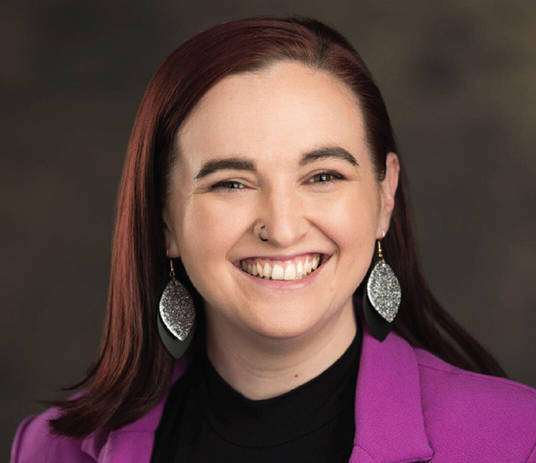
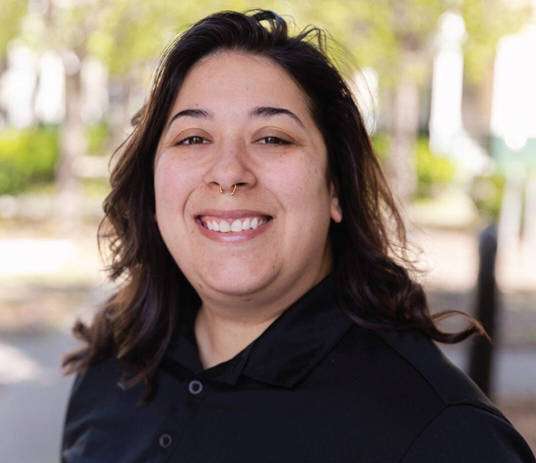
Ashley Valenzuela (she/hers)
Dispatcher and Owner of The Raspy Dispatcher LLC
5 years of service
“Engaging in any aspect of public safety is undoubtedly a demanding career. However, it’s crucial to remember that you are a human carrying out this critical role. Your unique life experiences, particularly as a member of the LGBTQ+ community, provide invaluable perspectives and opportunities to connect with and support your community in various ways. Embrace the power of your identity and the empathy it brings, as it enables you to make a meaningful impact and foster a more inclusive and compassionate approach to public safety.”
Michael Miller II (he/him)
Training Supervisor at Bedford Emergency Communications VA
13 years of service
“I feel being gay is a gift and it should not be something to be ashamed of. I feel I see the world differently, and try not to judge people, I instead want to try to make them feel welcomed with a smile and a hug. (HR, I always ask before approaching with these hugs). The gift of being part of the LGBTQIA+ community allows me to make someone that might feel like an outsider feel welcomed, feel like they can come and talk to me about anything they might need.”
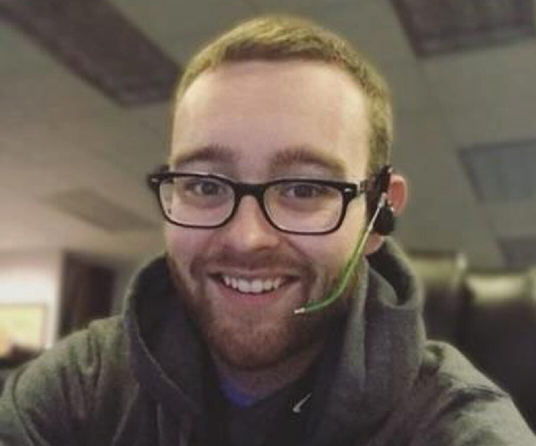
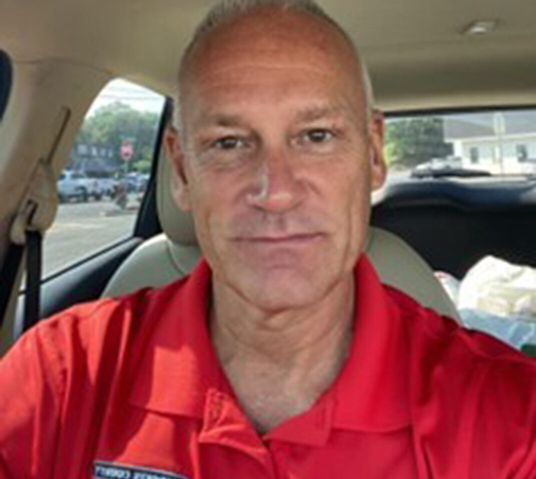
Shane Bonebrake (he/him)
Director of Cherokee County E911 GA
35 years of service (US Army Veteran, Firefighter/Paramedic, Flight Paramedic, Chief International Flight Paramedic, Dispatcher, Police Officer)
“I am blessed to be part of a county government that recognizes same sex sponsored benefits. Spouses receive the same benefits as heterosexual couples. I am very supported and respected in public safety throughout the entire State. Be yourself. EVERYONE MATTERS. Be proud, but do not let your sexuality define you as a Communications Officer. Gay, Straight, Trans-We are all here for the same purpose. TO SAVE LIVES !”
Tyrell Morris (he/him)
Executive Director of Orleans Parish Communications District LA
15+ years of service
“LGBTQ+ focused organizations are life changing and life saving as they provide a place cultivated for success where the status quo has fallen short. My advice to these organizations is that they also remain focused on inclusivity and continue to evolve with the needs of the people they serve. Advocacy work is never easy, but the impact is everlasting”
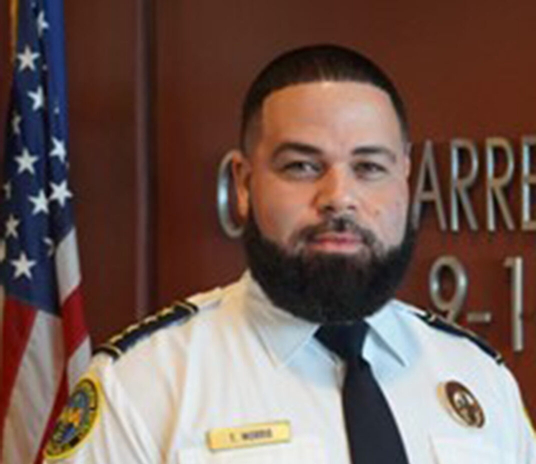
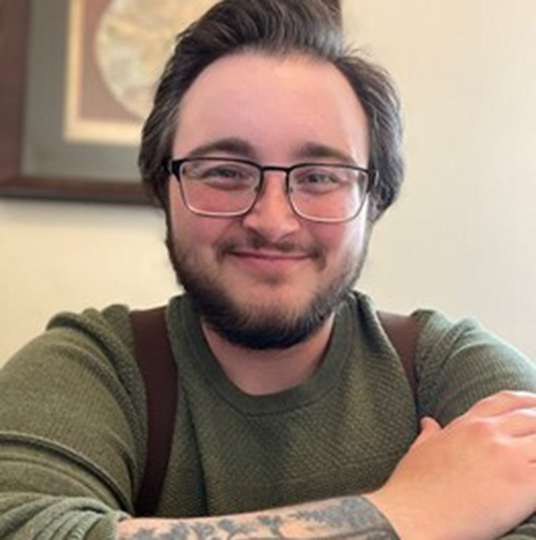
Wyatt Meyer (he/they)
Telecommunicator with Waukesha County Communications WI
3.5 years of service
“I was nervous coming into a public safety environment as a trans person, it was my goal to be “stealth” through the process but at the time I was passing as a man but I hadn’t legally changed my name yet. Legal names were required for CAD so I was outed right away. This was something I was hoping wouldn’t happen but was also completely prepared for and understood the why behind. I was also nervous because I was beginning to dispatch for the most conservative county in my state and I really wasn’t sure how it would go. Thankfully I didn’t need to be nervous. While the CAD had my dead name everything else had my legal name and my team was nothing but supportive. Years after I started at WCC I found out that another queer member of our team had heard that a trans person, me, was starting at WCC and reached out to the supervisor team to see what they could do to ensure that I felt welcomed and safe. I think that was huge gesture. I’m also grateful that it was never made out to be a big deal. I was just accepted as one of the team, eventually I got comfortable enough with myself and others to make jokes about my transition, like when another dispatcher said that only women could have brownies and I responded with “well that’s it I’m switching back.” I think this probably helped put some of my other team members at ease, to see that I wasn’t taking my transition so seriously and it helped people feel comfortable enough to ask me questions. I ended up having a lot of really great conversations with people who likely otherwise never would’ve asked or known to ask. WCC was also incredibly supportive when I brought up doing an LGBTQ+ training for new dispatchers and other emergency responders through the county. Giving me time and a space to share information that as a trans person I felt it was important for dispatchers and responders to know to keep all of us safe.”
Pride in Public Safety
Many police and fire departments in major cities have been instituting LGBTQ representation training for over a decade, and we’ve seen an evolution of recruitment tactics to proactively encourage LGBTQ members of the community to serve in law enforcement. To better serve the LGBTQ members within their own communities, police departments across the U.S. started to implement LBGTQ Liaison Groups and to create safe space for LGBTQ officers, states like NYC have the Gay Officers Action League (GOAL). Many local police departments walk in the Pride Parade festivals each year, although community relations with police departments have been turbulent of late. It’s important to remember the history of LGBTQ relations with law enforcement in order for that history not to repeat.
“We need to acknowledge the hurt that has occurred historically between public safety and the LGBTQ community. It’s valid. I believe in impacting the system from within; as a member of the LGBTQ community and a member of public safety, I can advocate for change within the department and the community I help to serve,” says Dispatcher Ashley Valenzuela
Although the gay rights movement started years before the first pride, Gay Pride began as a riot June 28, 1969 when NYC police raided the Stonewall Inn, a popular gay establishment. The officers began arresting people who violated the gender-appropriate clothing statute and the patrons began to fight back, riot, and protest for days afterward. To commemorate the Stonewall Uprising, on June 28, 1970, thousands took to the streets in what was called The Christopher Street Liberation Day which marked the very first pride march in America.
Unlike our other public safety counterparts, as 9-1-1 professionals, we are often left out of sensitivity trainings, the focus groups, and the celebration entirely. We are not part of the parade day marches and many centers don’t train on how to handle implicit bias calls that may target members of the LGBTQIA+ community.
“I think dispatch is no different than street public safety officials. We are certified Peace Officers and hold the highest of reputations. My sexuality does not define who I am as a public safety official, [but we need] to educate every employee on equality and inclusion. As a Director if I make a big deal out of it, I can create division, so I think providing classes on inclusivity and equality as an annual training helps and if an issue arises; take care of it,” says Director Shane Bonebrake.
In recent years, we’ve seen national organizations create much needed 9-1-1 focus groups for young professionals and women in 9-1-1, but there are little to no official spaces for LGBTQ voices. We are often left to self-organize in underground groups on social media planning our own events with lack of sponsorship or support. There are no official events that recognize the spectrum of our diversity and contribution to the front line work.
This pride month, I think it’s important to recognize and celebrate those brave voices within our 9-1-1 organizations who have the courage to live authentically. I want to thank my old 9-1-1 center Fairfax County Department of Public Safety VA for allowing me to live my own truth, at my own pace, and accepting me when I was ready to live authentically. No one’s journey through self-discovery is the same. To be LGBTQIA+ is not a monolith and for many of us that have endured shame by our own families, we find comfort in the care of our chosen 9-1-1 family.
“In Virginia Public Safety, I can say what I have encountered (mostly 9-1-1 services) everyone is welcomed. I actually feel like my work family helped me come out and be who I am today. Through conferences, classes, and presenting sessions, I have not met anyone that has not welcomed me. In general I feel like public safety is a place where you can be yourself and we understand that our main job is to help the community and trust our partners/co-workers in the process to help everyone get home to their families,” says Dispatcher Michael Miller.
Celebrate your (un)Hidden heroes because it is not easy embracing your difference. Celebrate those that have yet to find their pride and meet people wherever they are. With all that is against the LGBTQIA+ community today, let us not be the antagonist in our own story. Our 9-1-1 centers have to proactively nurture all voices, all bodies, all people because we are all beautiful with so much to give. Stand with us this month as we continue to fight for equality, equity, and justice. As we continue to show the world that we too are loving parents, husbands, wives, partners, teachers, community members, and proud public servants. Celebrate the “encanto” that lives in all of us.